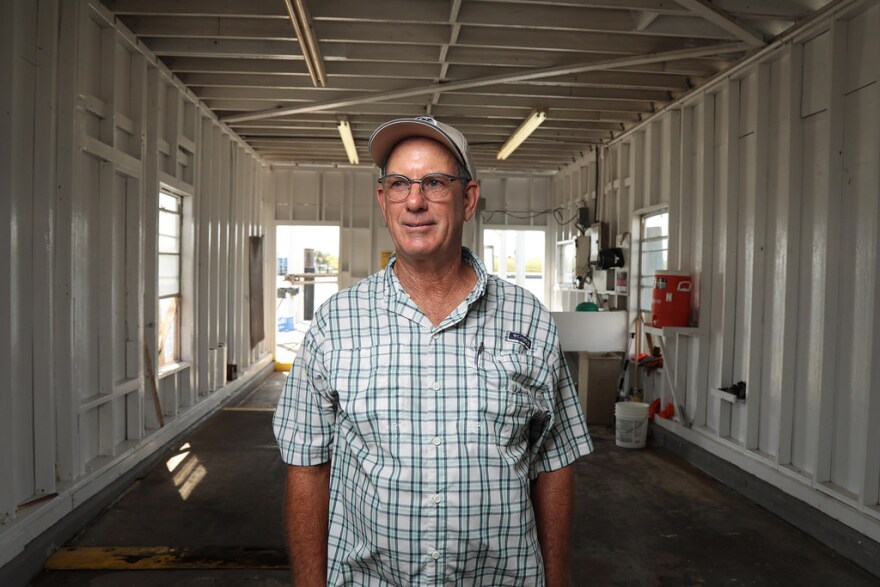Hurricane Harvey took a big whack to the shrimp industry's bottom line in Texas, but the storm's legacy may be what it did to the smallest shrimpers on the Coastal Bend.
Through a few generations of shrimping, Erickson & Jensen Seafood has become essentially a one-stop shrimp-boat shop in Aransas Pass. Shrimp boats can unload shrimp, sell them for cash, buy fuel and boat supplies and then pay for parts and repairs.
The company has a similar facility in Fort Myers, Fla., and it owns 12 boats that fish the Gulf of Mexico every summer.
After shrimpers offload their catch, owner Grant Erickson then sells those tons of tiny shrimp to wholesale buyers. Then, eventually, it makes it to your plate.

Erickson has seen the shrimp business change through the years. The industry has consolidated, and his competition has spread farther apart – Port Isabel to the south and Palacios, Galveston and Port Arthur to the northeast.
But the biggest changes have been to the boats. There are fewer of them, but they're bigger.
"There’s only now approximately 20 percent of the boats that there used to be at one time," he said. "What has happened is the boats have gotten better. The boats catch much more shrimp than they used to back in the day."
Each one leaves for weeks at a time, catching tens of thousands of pounds of shrimp, all frozen in the belly of freezer boats within minutes of leaving the net.
"We don’t deal with any boats that deal with ice. Anybody that brings in fresh shrimp [packed in ice], they’re dealing with the bait shops."
But those faster boats offer another advantage for seafaring shrimpers: They can more or less outrun hurricanes.
"Well, the strategy when a hurricane comes is, ‘Run from it,'" said Erickson. "The boat travels at about 10 knots, which is approximately the same speed that a hurricane moves. Just go until it peters out, hits land – gets gone."

Jessey Clapham is a seasoned shrimp boat captain working for Erickson, and he’s got the tall tales to prove it.
"I’ve caught bodies," said Clapham. "I’ve caught cows. I’ve caught helicopters. I’ve caught Army Jeeps. I’ve caught missiles. I’ve caught front porches of houses."
But, when Harvey was headed for land last year, Erickson & Jensen closed. The crew and staff evacuated, though, Jessey Clapham and Vu Hoang Thanh (aka Capt. James) stayed behind to protect the ships from the impending storm surge.
With his phone, Clapham put some of the storm live on Facebook as he ran out to tie off outriggers – the poles that fasten the shrimping nets to a ship's hull – had snapped in the winds.
Thanh, the skipper of the shrimp boat "Capt. Kenny," stayed at the helm — all night, on the throttle, moving the boat with the storm. Like a swimmer, he treaded water to keep the boat in place so it wouldn't rip away from the dock.
When daylight came, they took stock.
Some of Erickson's customers, two 100-foot shrimp boats moored in the bay, were not so lucky.
They capsized and were eventually scrapped. Four smaller boats, those ice boats he mentioned, sank and were scrapped, as well.
Neither of Erickson’s boats sank. They lost antennas and lights, outrigger poles snapped, but that was the extent of the damage, as far as his boats were concerned.
Erickson's building, however, lost its roof and most of the contents inside.
As a result, the Texas shrimp season was effectively over for Erickson's boats and for his crew. He estimates that could be $50,000 to $100,000 in losses per boat, but he counts himself as fortunate.
"It was truly devastating," he said. "Fortunately, I’ve being able to overcome the problems that I had, and have recovered and am still recovering."
Up the coast about 11 miles in Rockport, Stephanie Huang's recovery hasn't been so easy.
Huang runs Fleming's Bait Stand, which was wiped by the hurricane from its prime location near the Maritime Museum on the Rockport Harbor. Huang says she and her husband had a good life before the hurricane. Business was good, with loyal customers, and her husband captained a small shrimp boat used to stock the bait shop – until Harvey hit.
"We lost everything," said Huang. "I lost my business, my boat, my house, you know, a lot of damage around."

With some help from the museum, which she leases the stand from, they were able to rebuild and they reopened two months ago. Their boat was eventually repaired, too, but the uncertainty about their future took its toll.
"My husband was depressed, and he got sick," she said, "and right now, we got the business built back up, but we have to get my bait, my shrimp, everything from some other people."
She says her husband now has cancer, and even with the boat repaired, it may be a while before he’s able to take it out.
Buying shrimp from others has put the squeeze on the money coming into the Huang household, which was also severely damaged. Still, she's grateful for the help they’ve received and hopes her customers will get her through her own personal storm after Harvey.





